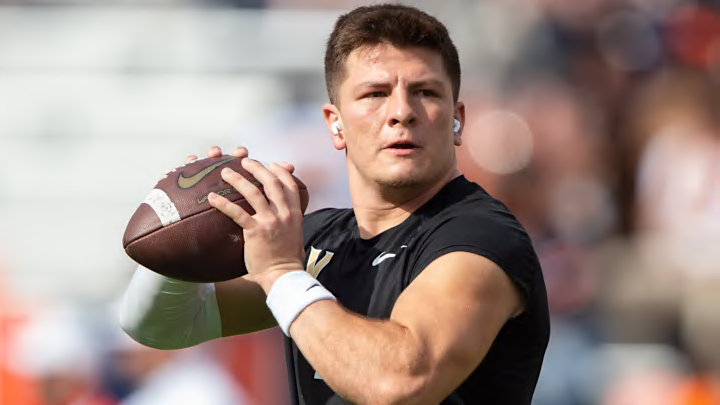If we've learned anything about current Vanderbilt QB Diego Pavia over the last couple of years, it's that he's never one to back down from a fight. This is a guy who scratched and clawed his way from the New Mexico Military Institute all the way to the SEC, who once, uh, relieved himself at midfield in a rival's stadium, who went toe-to-toe with the entire state of Alabama and refused to blink, who managed to use "Vanderbilt" and "turnt" in the same sentence. Much like Han Solo, never tell that man the odds.
But Pavia's newest opponent is his toughest one yet, and it has nothing to do with anything that happens on a football field. Amid a dream season with the Commodores, who have already secured bowl eligibility at 6-3 and have another big game coming up on Saturday against South Carolina, Pavia is fighting to ensure that he won't be the last JUCO success story to shock the world.
Diego Pavia sues NCAA over JUCO eligibility rules
Pavia announced on Friday that he's filed a lawsuit against the NCAA, alleging that its rules regarding junior college eligibility violate antitrust law. Specifically, Pavia objects to the NCAA's policy of counting JUCO seasons toward NCAA eligibility (despite the fact that the two play totally separate classes of football) and the rule prohibiting a player from redshirting after having already used four years of eligibility at an NCAA institution.
Diego Pavia has sued the NCAA.
— Mit Winter (@WinterSportsLaw) November 9, 2024
He alleges NCAA rules that count juco seasons towards NCAA eligibility & that prohibit redshirts from being used after an athlete has played 4 years at an NCAA school violate antitrust law.
He alleges the rules cause athletes to miss out on NIL $. pic.twitter.com/Oq8kXfPgMo
It's hard not to feel for Pavia here. Any change that gives us more opportunities to watch him play on Saturdays is a good thing, and the NCAA frequently has its head in the sand when it comes to issues of amateurism and player eligibility.
That said, this might be taking things a little bit too far. The JUCO rule exists for a reason; in a world in which athletes are also students, their eligibility upon transferring from the junior college ranks to an NCAA school was intended to reflect their status as students. If you'd already completed a year or two's worth of JUCO credits, the thinking went, then it makes sense that you'd have two years of athletic eligibility remaining upon transferring. And while players deserve the chance at four full years of a collegiate career, we're starting to stretch the rules around redshirting to their breaking point. There are players now in their seventh and eighth years of eligibility, 26-year-olds playing against 19-year-olds.
Especially given that NIL money has made playing college football an increasingly viable career choice, you can't blame Pavia and others like him for trying to maximize their net worths. This isn't really anyone's fault, so much as it is the product of a contradiction that remains at the heart of big-time college athletics: These athletes are in every other way employees, but our insistence on clinging to the idea of amateurism winds up in some strange places.
